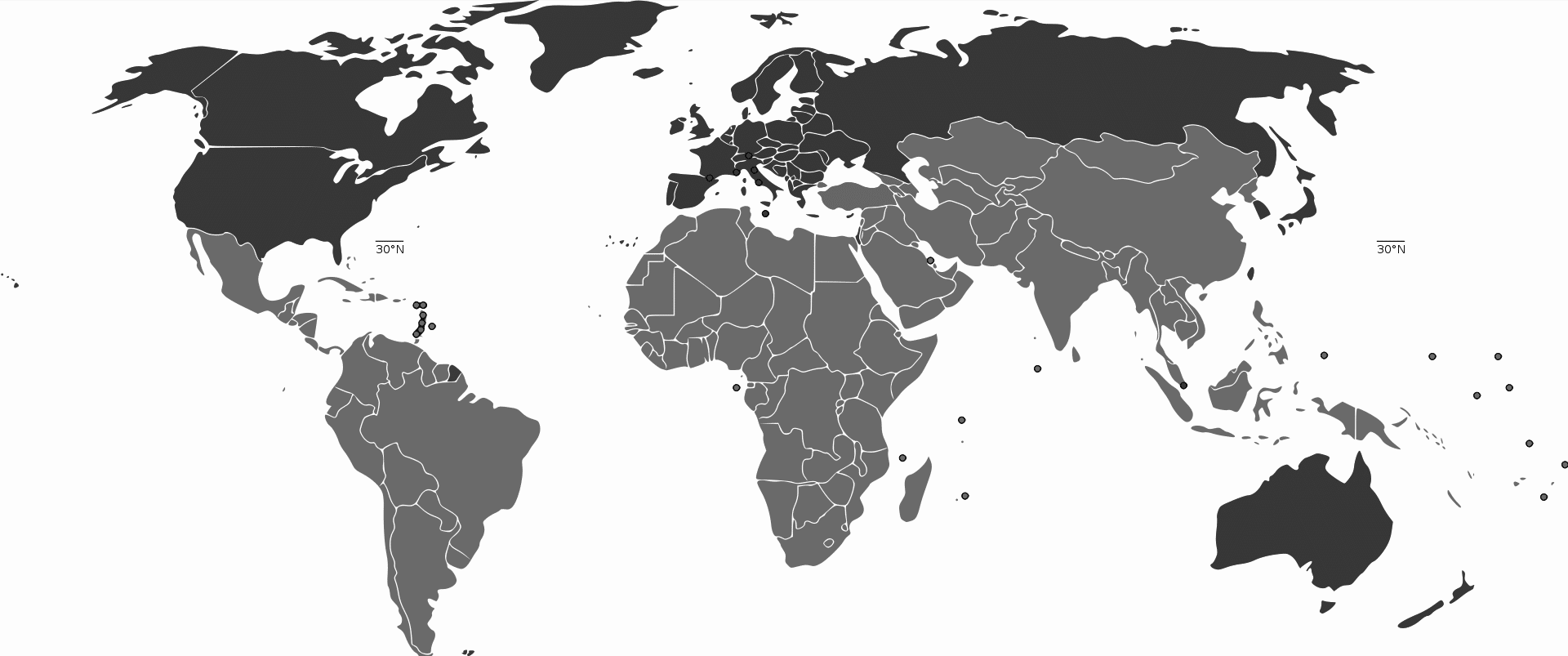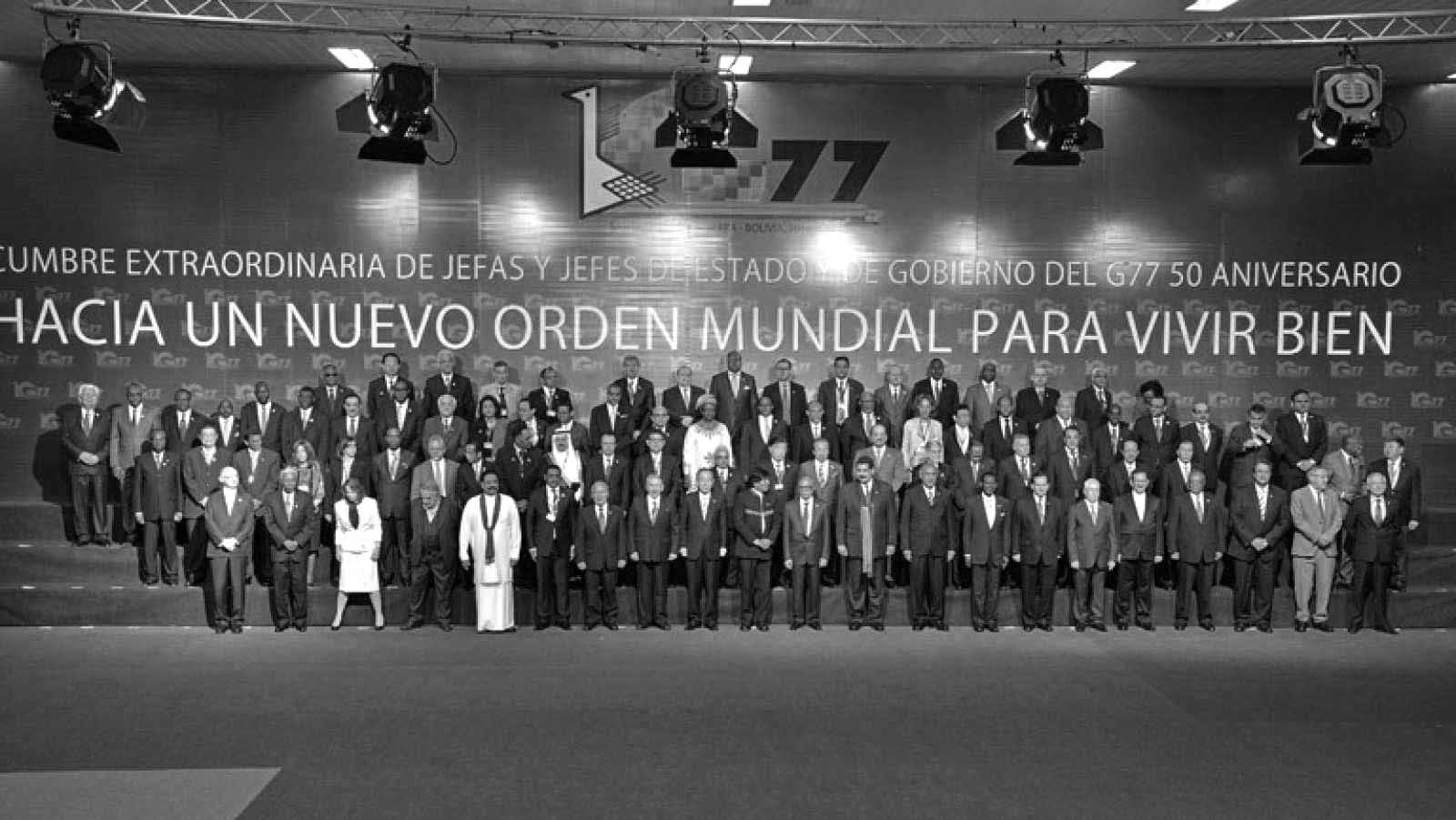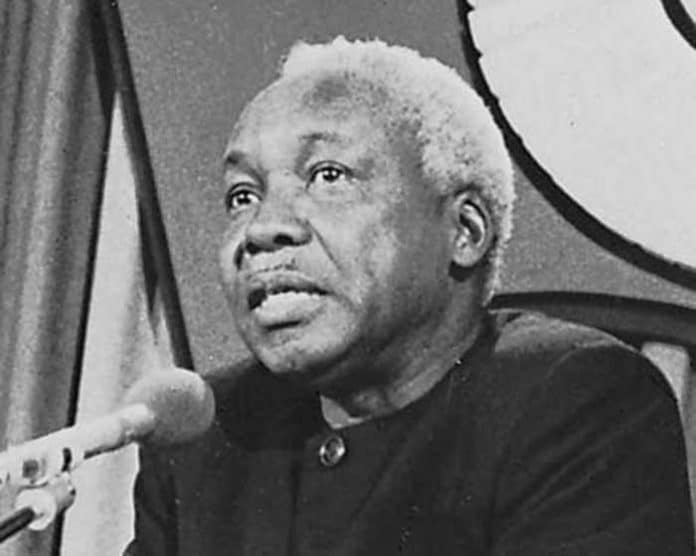Address by Mwalimu Julius Kambarage Nyerere, Chairman of South Centre
Speech by Mwalimu Julius Nyerere, Chairperson of the South Center, at the 1st Session of the House of Representatives 18 September 1995 Geneva. Opening Ceremonies.
Mr. President; Gentlemen, and Friends.
The history of our existence here today is known to all of you. The South Commission published its final Report in 1990, and before closing itself it decided that a small office should be created for two years to disseminate its recommendations and promote their implementation. But when the Commission Members met again in 1992 to complete the South Center, it was already important for many institutions and countries in the south. They had found it helpful as a source of good analysis of policies aimed at the development of the people, and the development of a common Southern platform and were sending messages to protest its closure.
So I was asked by former members of the South Commission to hold further consultations, and if it was good to find a way to transform the South Center into a permanent institution. Major consultations were held; The consensus was that the Southern Center that is permanent could greatly assist Southern countries in their efforts for Solidarity and Cooperation between them, and in their efforts to build the development of the people in independence.
Preparing a permanent facility has taken longer than previously expected. Even now it is only possible because of the dedication of a very small number of staff at the Center, the cooperation that has been received from the Swiss Authority at all levels, and the support of a small number of Southern countries – especially the current Chairman of the Non Aligned Movement. , Indonesia.
The new, Inter Governmental South Center we are launching today is NOT the Southern Secretariat that was highly recommended in the Final Report of the South Commission – ‘Challenges for the South’. It is a Center that has so far planned and coordinated the analysis – for South and by South – new or specific development (international and national) issues. In other words, the Southern Center is a small Southern ‘Research Group’. Its work is based on the ideology that Southern countries can cooperate, or work together, more effectively when they acquire greater and collective knowledge and understanding of key international issues, and the impact of these questions on the independence and development of our countries.
The conclusions of the South Commission have continued to remain valid and form the basis of the work of the South Center. But the world has changed since 1990 and is still changing very quickly. The Cold War has come to an end; there is one camp with great potential, not two. The quantity, and achievement, of new scientific and technological advances is expanding at an alarming rate; the economic, political, military, and social units that have the knowledge, skills, and capital required to use these developments have new power and reach those who do not have these assets. And the fundamental implications of the final Agreement on Uruguay Round trade talks for developing countries have not yet been fully recognized.

No country, and no part of any country, can escape the effects of these recent and ongoing changes. We in the South must try to understand what it is, and what it means for our development options. We need to know about the opportunities they present, and their risks in our developmental ambitions. And since there is a need for international action to adopt a shift towards universal access to human services, it is important that the South understands that its needs are different from the needs and aspirations of the richest and most developed countries.
Once understood, the Southern countries need to be in a position to take collective action to maximize the benefits of the South as a result of these talks or international decisions. The function of the South Center, in accordance with the capacity given by the South, will be to provide a common position for consideration. It will be reflected in the documentations which provide information and analysis of major issues, or evolving issues, and which are also recommended to Southern countries and organizations steps that they could consider taking, separately or collectively.

Needless to say, identifying and articulating the common interests of Southern countries is not the same as seeking conflict with Northern countries. The existence of different groups of countries as represented by the Organization for Economic Co-operation and Development (OECD) on the one hand, and the 77th group and China on the other, is a true illustration: differences in the level of development, and therefore differences in power. , in the world.
The inequality of world power places a responsibility on all of us to continue to strive to reduce it. But it does not mean that there are conflicts between developed northern countries and developed Southern countries. Many Southern leaders have made it clear over and over again that governments and people in developing countries do not want conflicts and tensions between the South and the North. On the contrary, the South recognizes that all countries of the world are interdependent; we all affect each other with all our actions. The actions of the rich and powerful have a greater impact on others than events in poor and weak countries. That is the meaning of the difference in power balance. But even our poverty or smallness affects others by what we do or fail to do. North-South cooperation is needed, not North-South conflicts.
A different level of interdependence has always existed. But now, with the speed and state of modern communication, the effects of external development or decisions can be very rapid – and very serious – regardless of distance or state of diversity. For the weak these effects can sometimes be serious. We in the South must be able and willing to speak, and sometimes defend, our own interests as change takes place or is threatened.
Doing this is not a struggle. It is a common process of dialogue between groups with different interests. And it is in the interest of all people – North and South as well. For in reality the development of the world can only be done on the basis of human equality, and national equality; change will be beneficial for the peace and prosperity of the world when dignity is bestowed upon all, and when justice is available to all. Peace or development cannot depend on the oppression of Force, whether it be economic, scientific, political, or military power. Nor does world peace and development imply a compromise on the part of those whose interests have been neglected or further suppressed, but they find themselves at risk of negotiating or even opposing. All governments sometimes find it helpful to have someone who can say what they would like to say, but from the words of whom they can do this, under pressure, isolate themselves if necessary. Sometimes the South Center will say things like this!
And just as the South Center is not a Southern Secretariat, nor is it a Political body that will sit to decide on the performance of Southern countries, and on conflicts between Southern countries. Our concern is related to economic, social, and cultural issues that are harmful and affect the peace and development of our African countries and their people.
Nor is the South Center a performance tool of any kind. To the best of its ability it will analyze the international or regional goals related to the development of the people of the South and its people. If appropriate, it will make recommendations on possible South measures. But it will be up to the governments and the people to decide what action they want to take and what they can do. The South Center’s paper and documents shall be free and fair; they will try to articulate the interests of development in the South and encourage a number of ways of the problems of development. But they will not create ‘Policy Documents’ for any Southern Government, or any Southern institution.
This description of the South Center is NOT, implies that if the Center is to be valued in the South, its function must be used by the people, governments and institutions of the South. The tool becomes useful only for use! We hope that the information and analysis of the South Center will be read, and its recommendations will be considered as a basis for possible action.
The need is there. Our countries are facing a global environment, and a global economy, dominated by the powerful developed nations of the North, and international institutions are largely created on the basis of the values and interests of the North. It is an understatement to say that the values, aspirations, and interests of the South are often – and especially the smaller Southern states – are overlooked as if they were not important. The existence of the South Center is based on the belief that developing countries can be resilient – as they work together, collaboratively and with coordinated efforts. We should not be ignored. We are too many to ignore. But as Rajiv Ghandi once said: if the South wants to be among, the South should stand and be among.
As such, the South Center has a positive role to play in motivating, promoting, and facilitating the South’s collective action.
We prepare and make our analysis of issues available to all Southern countries; We also hope to support the various programs of Group 77, Non Aligned Organizations, and other Southern bodies, to be more effective in serving the needs and policy decisions of Southern countries. And we will try to continue to work with the United Nations institutions to promote “economic and social development for all”. At the same time, we continue to advocate for the reform of international institutions at a time when this seems to be crucial to achieving the stated purpose.

Friends: I’ve talked about what the Center has been attempting to do. I have explained what it is not, and what it is expected to be. But the capacity, and size, of the South Center will depend on the future as in the past on the support it gets from the countries of the South. At the moment we have a good reputation, because people are kind and appreciate even the little help we have been able to give. But my colleagues and I are very aware of the things we have not done that should have been done, and especially those that could have been worthy to be done.
We are, and would like to continue to be, a small institution that collaborates with other Southern research and development institutions, and which organizes and coordinates collaborative work with Southern experts on key issues of current or future relationships for development. However, the size of our current staff is very small; some increase will have to be made if the South Center wants to be more efficient.
Closing
From all that I have said, I think it is clear that the future work of the South Center, in fact continuing to function as an important instrument, requires political, and intellectual support from the Southern governments and from non-governmental organizations. Unfortunately it means that the South Center needs financial support from the South. We need this from the government, from public and private business, and from other Southern financial institutions.
If the South Center continues to be a Southern service institution it must be a Southern institution in every sense. Help from friends in the North, will really help. But the South Center must remain a Southern instrument or it will be nothing.
The South Center is now the Southern Governments Agency. But according to the Convention it will still seek to serve all the people and every organization of the people of the South. And its value to all, in the near future as it once did, will depend on its intellectual independence and self-government. Only in those cases will it be able to continue the work that I have identified, and which our past activities have made you aware of. We need your help to serve the South.
Friends: While thanking the governments, institutions, and individuals of the South – and the North – for their past support and cooperation to the South Center, I ask for your continued support and expansion in all areas. Thank you.
Speech by Mwalimu Julius K. Nyerere at the Opening Ceremony of the Second Session of the House of Representatives at the United Nations Board of Trustees in New York on 21 September 1998

South Center House of Representatives. We pay tribute to the presence of our distinguished guests – President Mandela and Minister Al Atas, whom I warmly welcome and thank for their time from their busy schedules to be with us here.
Over the next two years the Council will review in detail the completed work and experience gained over the past three years and will list the future direction of the South Center. In this opening session, and in the presence of our distinguished leaders from the South, I would like to emphasize the political and practical significance of the South Center.
Together as the South, we run and live in an environment of economy and politics that is outside, which severely impacts and reduce our opportunities and our choices and options for economy and social environment which are not “God given”. They are “manmade”, and those who design and run them happen to be the most powerful from the North.
We from the South have little to say, if there is anything about this external arrangement, its rules and the application of these laws. We have very little influence, if any, on its performance and management. Our position is not supported by the weakening of the United Nations and the voice in the economic spheres, and the general erosion of democracy in international relations and world governance. As the world becomes more and more globalized its governance at the international level becomes more authoritarian and / or – more and more chaotic.
That is why this small ceremony to inaugurate the Second Session of the South Centre House of Representatives at the United Nations (UN) Headquarters and in the presence of our distinguished guests takes special importance. It signifies the need for the South to mobilize its resources and work together for a global system of justice, equality and democracy. This conference highlights the importance of technical preparation and careful thought in order to support the position and performance of the South.
If we in the developing world shape our own destiny, and actively participate in shaping the future and the state of the world in which we live, we must have an effective voice. But we will not have an effective voice if we do not work together, at least in the areas that are most important to all of us. Together we can reduce the differences in our weaknesses. Working together we can be strong; we can acquire a bit more influence in the world.
It was at the Non Aligned Movement (NAM) Conference in Belgrade in 1989 when the late Rajiv Gandhi of India stated: “If the South wants to take part, it must stand and be a part”. A group of 15 was formed at the Conference.
Institutional support is essential in this activity. Northern countries know this very well. They use the vast resources of their institutions to reach their collective objectives. I am told, for example, that the Secretariat of the Organization for Economic Co-operation and Development (OECD) has 2000 member staff and a budget of $ 330 million a year. No one expects that we South Countries could or should be able to match that kind of capacity building research.
But we need our professional and technical background behind ourselves, albeit ordinary in the sense that without it we in the South will remain at a general level with general information. Despite their natural value, such statements have little effect, especially in the deeply concerned political climate toward the call for equality, justice and democracy. The international environment is best known for its great power, economy or military. They can be influenced by the power of knowledge, organizational management. This we can try to achieve.
Just because of their personal weaknesses in the world sphere, Southern countries must work together to promote their cause together. For this reason they need institutional and intellectual support, and the South Center has been set up in part to address that need. The work of the South Center has so far been modest but – I believe – has already demonstrated the importance of, and the need for similar institutional support at the international level.
On the basis of what has been done so far, I am confident that the South Center will continue to be the strongest and most important as a intellectually and an independent thinking body of thought network of institutions and people dedicated to the South and to the development of its people.
But I would like to emphasize that while the South Center continues to provide support to Southern governments in their joint efforts in the global arena, the South Center is not intended to be, nor is it set up to be, an alternative to the Southern Secretariat. The South Center does not oppose the need for a full-time secretariat to support the work of the 77 Group and China, and another to support the Non Aligned Movement.
Closing
Ladies and Gentlemen, It is my hope that the importance of the South Center and its ability to work more efficiently will trigger more effort to the South to organize itself more effectively at the global level.
Thank you.
For more Nyerere speeches click here!


































